Profile
Carissa Wong
My CV
-
Education:
University of Bristol and Cardiff University (PhD)
University of Bristol (Undergraduate)
Forest School, London (A levels)
Trinity Catholic High school, Essex (GCSEs)
St Antony’s Catholic School, Essex (Primary School) -
Qualifications:
BSc Cancer Biology and Immunology
A levels: Biology, Chemistry, Philosophy, Mathematics
Open University: Human genetics and health issues short course
GCSEs: English language, English literature, Spanish, Triple Science (Physics, Biology, Chemistry), Mathematics, Statistics, Information Technology, Religious Education, Physical Education -
Work History:
Unpaid work experience at the Natural History Museum (London), and as a receptionist at a dental surgery!
-
Current Job:
PhD Student in Cancer immunology
-
About Me:
I love learning, music and appreciating the beauty of the natural world. My favourite things include walks, fresh air and dancing!
-
Read more
I live in Bristol with my partner. After a long day at work I love to relax on the sofa with some good music and do some catching up with the news and science communication things! I play the piano and guitar, sometimes I like to make my own music up. I also love to write spoken word poetry (poetry that you perform). I find painting really relaxing and I love to cook! On weekends I love to be outdoors, enjoying green spaces. My pronouns are she/her and I am passionate about fighting for racial and gender equality (feminism) and LGBTQ+ rights.
-
Read more
Our bodies are made of building blocks called cells, and the immune system is a special group of cells that protects us from germs (like bacteria and viruses) that cause diseases. When the DNA (instructions) inside a normal healthy cell gets damaged, it can turn into a cancer cell. A lump of cancer cells forms a ‘tumour’. A tumour can damage organs, making you very ill.
The goal of my work is to figure out how we can get the immune system to fight off cancer, in the same way the immune system fights off germs like viruses and bacteria! If we can help the immune system to kill off cancer, then we can provide cancer patients with more ways to get better.
My work involves using microscopes, which are like magnifying glasses, but with more features. Using microscopes, I take pictures of a particular type of immune system cell called T-cells. T-cells have the potential to kill cancer, but cancer often stops them working properly. Therefore I grow mini-tumours in plastic dishes, add T-cells to the tumours and try to work out how the tumours stop the T-cells from working properly. Importantly, I label the T-cells green and tumour cells red, so I can tell them apart!
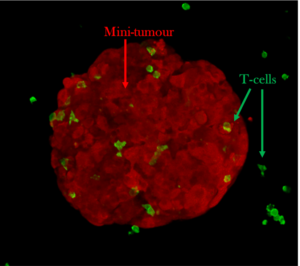
T-cells and a mini-tumour
-
My Typical Day:
I get up around 7.30am and walk to work for 9am. I go straight into the lab, which is the room where I check on all the cells that I grow. Just like us, the cells need to eat, so I feed them a pink liquid which gives them all the energy they need, and make sure they’re looking happy and healthy. I’ll pick some of them to mix together, label them with colours and spend a few hours on the microscope where all the magic begins!
-
Read more
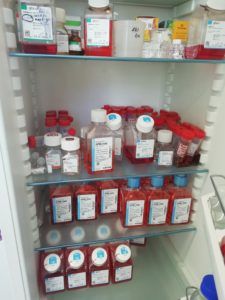
We keep the cells’ food in the fridge- bottles of pink liquid containing everything they need.
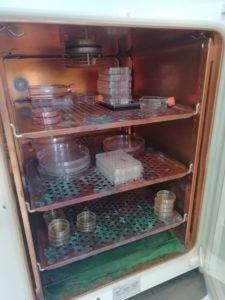
We keep our cells in the ‘incubator’, which is kept at 37 degrees Celsius- the temperature cells are happiest.
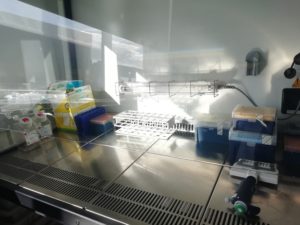
When I want to work with my cells (for example, if I want to feed them, or add T-cells to my mini-tumours) I take them to this ‘hood’ which has a special airflow to prevent the cells getting infected by bacteria or fungi in the air. I spend a third of my day here!
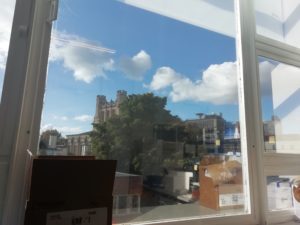
While I’m waiting for my cells to ‘spin down’ in a machine (which I do a lot because it helps me to collect them) I like to enjoy the view out the window!
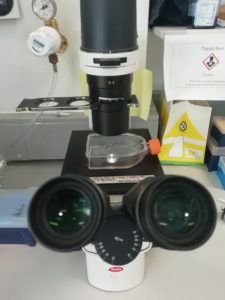
I use this microscope to quickly check my cells are happy, but I take pictures with a fancier, bigger one downstairs! On average, I spend a third of my day on microscopes.
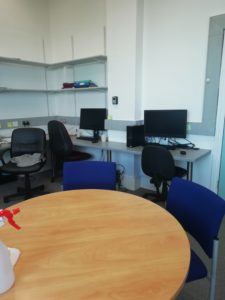
When I’m not in the lab, I’m in the office, where I do calculations and chat with my lovely colleagues! I might spend a third of my day in the office in between lab work.
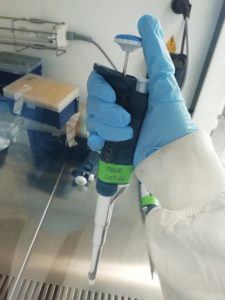
This tool is called a ‘pipette’ and we use it to move cells from one place to another. Pushing down the blue button and then releasing it sucks up the cells, and pushing it again forces the cells out!

I have to process my pretty pictures into numbers! This involves using computers to automatically recognise different parts of the pictures, this picture shows one step of the computer process. I work with an amazing physicist/computer scientist who helps me find cool ways to automate things!
-
What I'd do with the prize money:
I’d love to set up a science-communication themed spoken word (performance) poetry event. Bristol is full of great spoken word poets, it would be great to set up an event where they could perform pieces on sustainability, biodiversity, climate change or any exciting scientific topic!
-
My Interview
-
How would you describe yourself in 3 words?
Grateful, optimistic, feminist.
What did you want to be after you left school?
Scientist
Were you ever in trouble at school?
No deep trouble..
Who is your favourite singer or band?
Alicia Keys, at the moment.
What's your favourite food?
My mum's.
If you had 3 wishes for yourself what would they be? - be honest!
To never fall ill. To enjoy the moment, everyday. To always have the strength to fight for what I believe in.
Tell us a joke.
A photon (a small unit of light) checks into a hotel... The receptionist asks him if he needs help with any baggage. "No thanks, I'm travelling light."
-
